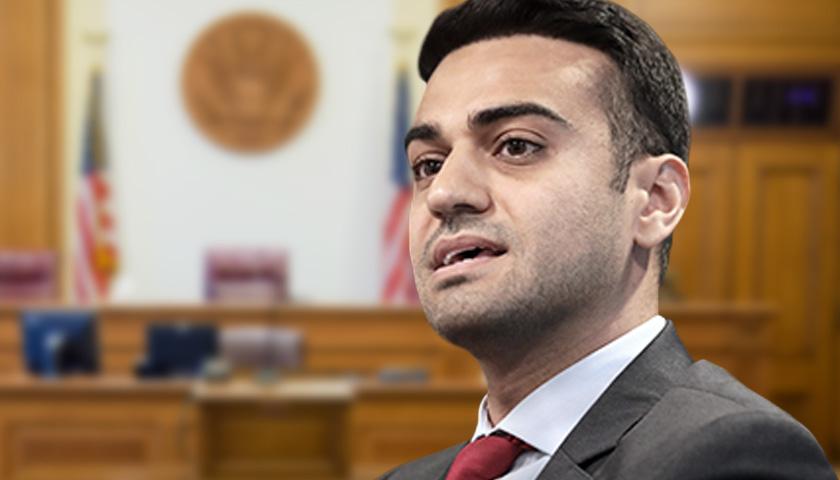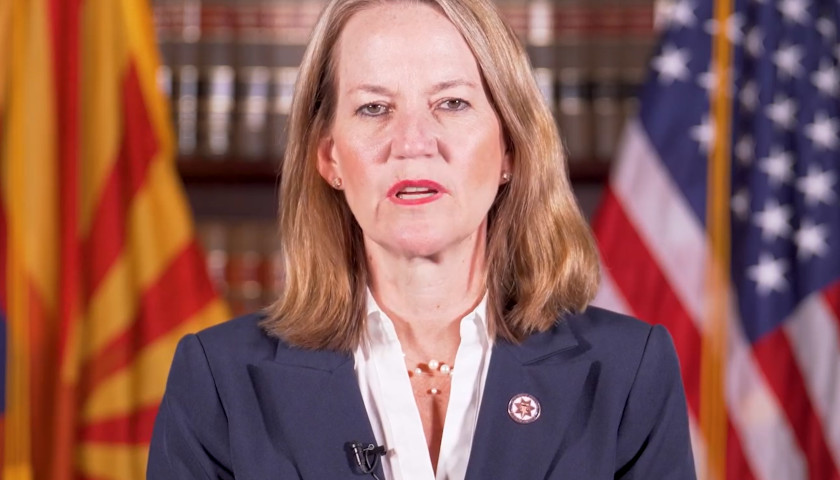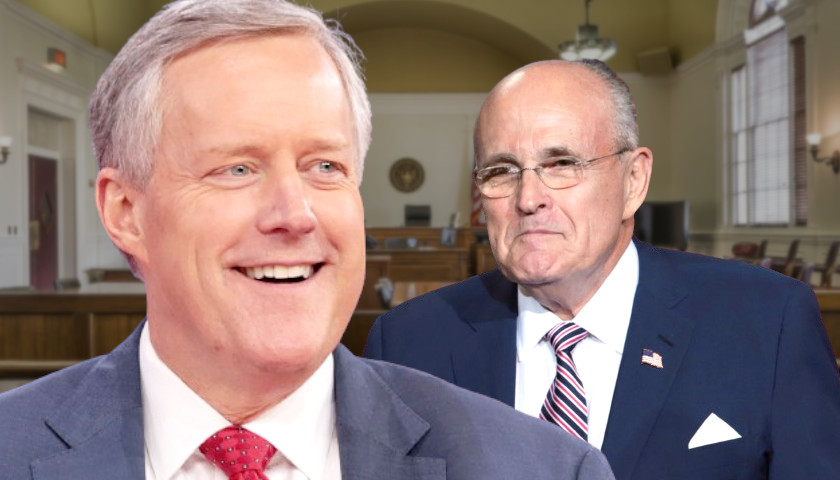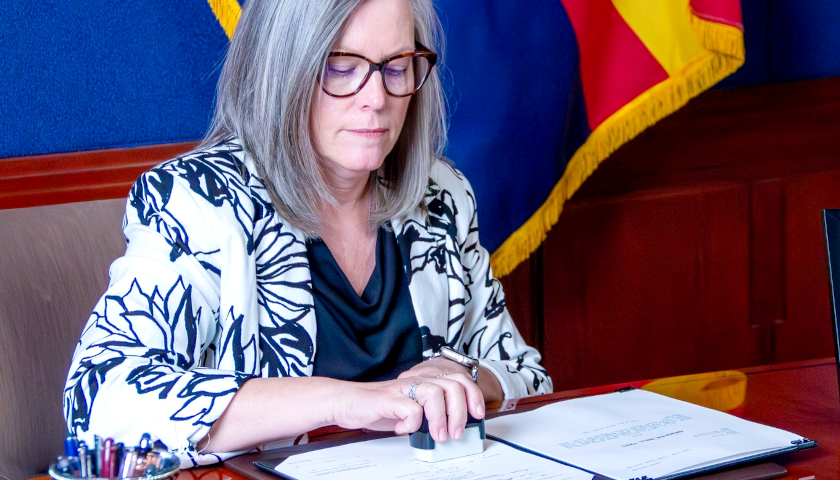Abe Hamadeh’s election challenge for attorney general continues to wind its way through the court system, with his attorneys filing a reply in Mohave County Superior Court supporting their motion for a new trial on Monday. The Consolidated Reply in Support of Plaintiffs’ Motion for a New Trial addressed the claims brought up in the response from defendant Kris Mayes, who was declared the winner in the race. The lawsuit, which included the Republican National Committee and Republican Jeanne Kentch of Mohave County as plaintiffs, was also filed against Secretary of State Adrian Fontes.
Hamadeh’s reply brief, led by former Attorney General Election Integrity Unit civil attorney Jen Wright, emphasized the race’s closeness as a reason for a do-over.
“After all, if this — the closest statewide officer election in Arizona history — is not worth an exacting review, whatever could be? That Defendants would lock up the underlying evidence and demand this ‘case [be] over’ is contrary to Arizona law, the interest of justice, and an affront not only to the democratic process, but to Arizona voters,” the brief said.
Since Hamadeh gained a significant number of votes from counting the undervotes from Pinal County, narrowing Mayes’ lead to just 280, the brief argued that his team should be able to inspect the undervotes from all 15 counties. He noted that in regard to the undervotes in Maricopa County, “The misread rate of 0.61% is more than 60 times the 0.01% margin of victory.”
Hamadeh’s brief stated that while the 63 voters who were disenfranchised in Pinal County have now been addressed, “To this day, the voters with ballots containing known misreads in Maricopa County remain disenfranchised.” The brief listed the reported number of undervotes in various counties, which included some significantly high numbers, such as 50,247 in Maricopa County and 8,751 in Pima County. It surmised, “This data suggests that counties that significantly exceeded the statewide averages may have tabulators that misread valid votes as undervotes.”
The reply characterized Mayes’ response as arguing that their motion for a new trial was “too little, too late.” Hamadeh said Mayes wants to “wish away the guarantees of due process” and “ignore longstanding precedent.” Instead, “This has been Defendants’ refrain from day one, constantly waiving the threat of seeking sanctions as the cost they seek to impose on electors and candidates who dare attempt to vindicate their rights in litigation.”
The reply brief emphasized three key reasons why a new trial should be granted. First, there was an “erroneous count” of the ballots, which led to the wrong candidate being elected. Second, there was “newly discovered (and questionably withheld) evidence,” referring to the 507 new votes found in Pinal County, which shrunk Mayes’ lead from 511 to 280. Then-Secretary of State Katie Hobbs knew about the additional votes for eight days but did not inform the public or Hamadeh. And finally, there was an “error of the court of not only limiting the inspection of ballots to a small sample (and excluding inspection of provisional ballots), but also failing to provide Plaintiffs time to meaningfully inspect the ballots in preparation for trial (not just hours before the trial).”
The court refused to allow Hamadeh an extension to postpone the hearing “after Defendant counties unreasonably delayed Plaintiffs’ statutory right to inspect ballots,” which Hamadeh said was an “abuse of discretion.” Furthermore, limiting the inspection to only a few sample ballots has “no statutory authority or judicial precedent.”
The brief said, “Maricopa County failed to timely respond to Plaintiffs’ request for production of records related to provisional ballots,” which “prevented Plaintiffs from timely discovering significant, likely outcome determinative, irregularities with provisional ballots.” It warned, “This Court should not reward Defendants’ tactics of misrepresenting critical facts and withholding relevant evidence such that it tarnishes the election process for years to come.”
Hamadeh also asked the court to look at provisional ballots, the ones that were “rejected on the grounds that the voter was not ‘registered to vote’ or ‘not eligible to vote’ in the November General election despite having successfully voted in the 2018 General, 2020 General, and/or 2022 Primary.”
He asked to examine “73 provisional ballots cast by ‘high propensity voters’ rejected as voting ‘out-of-precinct’ or ‘out-of-jurisdiction’ in Mohave County.” Hamadeh stated about those and provisional ballots investigated in other counties, “Plaintiffs have contacted many of those voters and have found that most have had no material changes that would have lawfully triggered their voter registration record to be cancelled since they last voted, suggesting a system or process erroneously disenfranchised these voters.”
The brief accused the defendants of acting out of “fear” of the “truth.” It explained, “That’s why Defendants sought to limit ballot inspection, prevented good faith inquiries predicated on unimpeachable data, and wish to silence anyone who dare use a statutorily prescribed process to test the accuracy of the vote count by demanding excessive sanctions and threaten bar charges.”
Hamadeh refuted Mayes’ assertion that a motion for a new trial is prohibited by election statutes, showing how the Rules of Civil Procedure allow for it and they take precedence over election statutes. “Based on the Defendants’ flawed arguments, a Motion to Dismiss would be similarly barred, however Defendants filed not one (Doc. 45), not two (Doc. 50), but three (Doc. 98) motions to dismiss (as well as joinders to said motions by two separate counties, Maricopa (Doc. 69) and Santa Cruz (Doc. 72)).”
Finally, the brief refuted Mayes’ claim that the election contest is moot by citing previous election contests in Arizona where the courts have removed officials from public office months after they began serving due to losing an election contest. In Hunt v. Campbell, the Arizona Supreme Court removed the Democrat governor and replaced him with his Republican challenger well into the year following the election.
– – –
Rachel Alexander is a reporter at The Arizona Sun Times and The Star News Network. Follow Rachel on Twitter. Email tips to [email protected].
Photo “Abraham Hamadeh” by Gage Skidmore. CC BY-SA 2.0. Background Photo “Courtroom” by Karen Neoh. CC BY 2.0.








